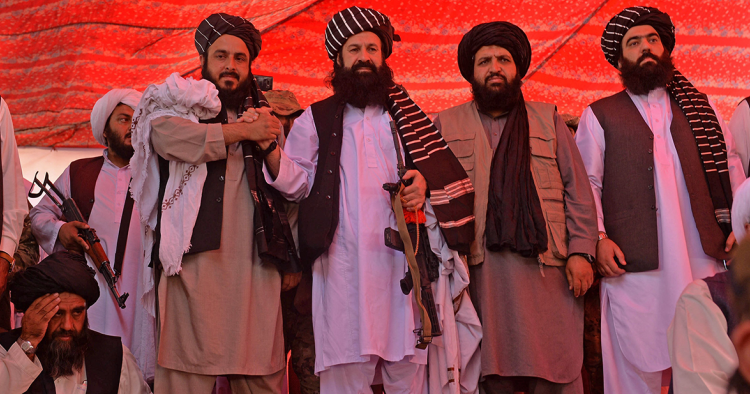
Image source: The Middle East Institute
by Zafar Iqbal Yousafzai 4 July 2023
Introduction
The question of engaging with the Taliban poses a significant challenge for the international community. On one hand, engagement offers the potential for political stability, peace, and the prevention of Afghanistan from becoming a terrorist haven. However, concerns arise from the Taliban’s history of human rights abuses and extremist ideology, which may impact women’s and minority rights. This article explores how different countries and organizations have approached engagement with the Taliban, the challenges in finding a balance between stability and democratic values, and proposes potential strategies for engagement.
Engagement with the Taliban: Benefits and Concerns
Engaging with the Taliban holds the promise of political stability and peace in Afghanistan. By bringing them into the political fold, it is possible to address humanitarian issues and prevent the country from becoming a breeding ground for terrorism. Furthermore, the Taliban’s control over significant portions of the country necessitates their inclusion in any sustainable political solution. However, the Taliban’s troubling history raises legitimate concerns. Their track record of human rights abuses, particularly against women and minorities, raises questions about the long-term impact of engagement. Uncertainties also exist regarding the Taliban’s true intentions and commitment to lasting peace, creating skepticism among the international community.
Varying Approaches to Engagement
Different countries and organizations have adopted diverse approaches to engaging with the Taliban, reflecting varying perspectives and priorities. Some have pursued diplomatic engagement and negotiations as a means to influence the Taliban’s behavior and secure commitments to democratic values and human rights. They argue that direct engagement offers the opportunity to shape the Taliban’s actions and foster a more inclusive political environment. By establishing clear benchmarks and conditionalities, such as respect for human rights and a commitment to democratic principles, these countries aim to hold the Taliban accountable and ensure progress on key issues.
Others have taken a more cautious stance, prioritizing stability over democratic ideals. They argue that engaging with the Taliban, given their influence and control, is necessary to avoid protracted conflict and further destabilization. These actors believe that focusing on stability and peace negotiations may gradually lead to an environment conducive to broader reforms, including the protection of human rights and democratic values. The challenge lies in finding a balance between these competing objectives. Balancing the pursuit of stability with the promotion of democratic values is a delicate task. Striking this balance requires a nuanced understanding of the Taliban’s motivations, the political landscape of Afghanistan, and the interests of the international community.
Conditional Approaches and Diplomatic Pressure
One strategy for engagement is to adopt a conditional approach that demands the Taliban’s commitment to human rights and peace agreements. This approach seeks to hold them accountable for their actions and ensure progress on key issues. The international community can utilize diplomatic channels to engage with the Taliban and exert pressure to push for reforms. By establishing clear conditions for continued engagement, such as the protection of human rights, inclusivity, and adherence to democratic processes, the international community can foster a more positive and sustainable trajectory for Afghanistan. Multilateral efforts are crucial in exerting diplomatic pressure on the Taliban, leveraging international consensus to push for positive change. These efforts can involve economic incentives, sanctions, or other measures aimed at influencing the Taliban’s behavior. By presenting a unified front, the international community sends a clear message that engagement comes with expectations and responsibilities.
Supporting Civil Society and Grassroots Initiatives
Another avenue for engagement is to support civil society organizations and grassroots initiatives within Afghanistan. These organizations play a critical role in promoting human rights, advocating for marginalized groups, and fostering inclusive dialogue. By empowering local communities, promoting education, and advocating for human rights, these initiatives can create spaces for dialogue and foster a more inclusive society. This approach recognizes the agency of Afghan citizens and seeks to empower them to shape their own future. Civil society organizations can also act as intermediaries between the Taliban and the international community, helping bridge the gap between different perspectives. By amplifying the voices of marginalized groups and advocating for their rights, civil society can push for inclusivity and accountability in the peace process.
Conclusion
Engaging with the Taliban requires a nuanced and careful approach. The international community cannot afford to leave Afghanistan to its own devices, as history has shown the potential consequences of neglect. However, finding the right balance between stability, democratic values, and human rights is a complex challenge. By adopting conditional approaches, exerting diplomatic pressure, and supporting civil society initiatives, the international community can play a vital role in shaping a more inclusive and sustainable future for Afghanistan. Continued engagement must be contingent upon the Taliban’s commitment to human rights, inclusivity, and adherence to democratic processes. It is through these concerted efforts that the international community can work towards a lasting peace that respects the rights and aspirations of all Afghans. Only by navigating the complexities of engagement can the international community contribute to a more stable and prosperous Afghanistan.
